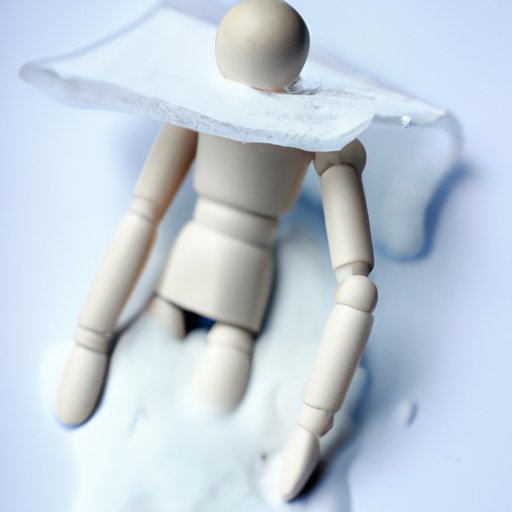I. Introduction
Have you ever heard someone say, “Don’t go outside in the rain without a jacket, or you’ll catch a cold”? It’s a common belief that being wet and cold can make you sick. However, is there any truth to this claim? In this article, we will explore the link between being wet and cold and getting sick. We will also provide tips on how to stay healthy when the weather is less than favorable.
II. The Truth Behind the Saying: Can You Get Sick from Being Wet and Cold?
The belief that being wet and cold can make you sick is not a new concept. The ancient Greeks believed that wet, cold conditions caused diseases, and in the 19th century, the medical community agreed. It wasn’t until the 1950s that scientific research began to disprove the theory.
When we say “catching a cold,” we’re actually referring to a viral infection caused by the rhinovirus. While cold weather can weaken the immune system and make it easier for viruses to take hold, it’s not the cold temperatures themselves that cause illness. Instead, the virus spreads from person-to-person or from contact with contaminated surfaces.

III. Science Explains: The Link Between Being Wet and Cold and Getting Sick
While the cold temperature itself doesn’t cause illness, being wet and cold can have an impact on the immune system. When the body is exposed to cold temperatures, the blood vessels in the nose constrict, reducing blood flow and making it harder for immune cells to fight off infection. Additionally, cold, damp conditions can weaken the skin’s natural barrier, making it easier for bacteria and viruses to enter the body.
Cold viruses can also survive longer in colder temperatures. In a 2005 study, researchers found that the rhinovirus survived better at a lower temperature, leading to speculation that cold weather conditions may prolong the virus’s lifespan and increase its chances of infecting someone.
IV. Debunking the Myths: Separating Fact from Fiction on Getting Sick from Being Wet and Cold
There are several myths associated with getting sick from being wet and cold. One of the most common is that going outside with wet hair makes you sick. However, there is no scientific evidence to support this claim. Additionally, drinking alcohol does not “warm you up.” Alcohol can actually lower the body’s core temperature, making it easier to get hypothermia.
Another myth is that chicken soup can cure a cold. While there is some evidence to suggest that chicken soup can help alleviate symptoms of a cold, it cannot cure the illness.
V. How to Stay Healthy in the Rain: Understanding the Risks of Being Wet and Cold
One of the biggest risks of being wet and cold is hypothermia. Hypothermia occurs when the body’s core temperature falls below 95°F. Symptoms of hypothermia include shivering, confusion, slurred speech, and loss of coordination.
To stay healthy in the rain, it’s important to stay dry and warm. Wear waterproof clothing and carry an umbrella. If you do get wet, change into dry clothes as soon as possible and take a warm shower or bath to raise your body temperature.
It’s also important to stay hydrated, even if you don’t feel thirsty. Cold weather can make the body work harder, leading to dehydration.
VI. The Importance of Layers: The Role of Clothing in Preventing Illness from Being Wet and Cold
Dressing appropriately for cold and rainy weather is key to staying healthy. Layering clothes traps air between each layer, providing insulation and keeping you warm. Start with a moisture-wicking base layer, add an insulating layer for warmth, and finish with a waterproof, breathable outer layer.
Don’t forget about your feet! Wear waterproof shoes or boots and change into dry socks as soon as possible if your feet get wet.
VII. Rainy Day Wellness: Tips for Staying Warm and Dry to Prevent Getting Sick
Staying mentally well on rainy days can be just as important as staying physically healthy. Try to maintain a positive attitude and participate in activities that bring you joy, such as reading a book or watching a movie. You can also engage in light exercise, like taking a walk, to boost your mood and energy.
VIII. Exploring Home Remedies: How to Treat Symptoms of Illness from Being Wet and Cold
There are many home remedies that can help alleviate symptoms of illness from being wet and cold. Drinking warm fluids, such as tea or soup, can help soothe a sore throat and ease congestion. Steam from a hot shower or humidifier can also help relieve respiratory symptoms.
Additionally, there is some evidence to suggest that zinc supplements can shorten the length of a cold. However, it’s important to talk to your doctor before starting any new supplements.
IX. Conclusion
So, can you get sick from being wet and cold? While being wet and cold can weaken the immune system and make it easier for viruses to take hold, it’s not the cold temperatures themselves that cause illness. By dressing appropriately for the weather, staying hydrated, and taking care of your mental health, you can stay healthy on rainy days.
Remember, the key is to stay dry and warm, and to seek medical attention if you experience any symptoms of hypothermia or illness.
